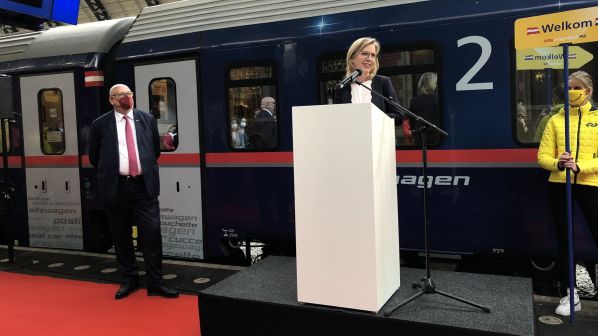AUSTRIAN Federal Railways (ÖBB) and Netherlands Railways (NS) have launched a new daily overnight Nightjet service from Vienna and Innsbruck to Amsterdam.
The first train left the Austrian capital on May 24 with Austrian climate protection minister, Ms Leonore Gewessler, and ÖBB CEO, Mr Andreas Matthä onboard, arriving in the Dutch capital the next morning. The service was welcomed by Dutch state secretary for infrastructure and water management, Ms Stientje van Veldhoven, and NS president, Ms Marjan Rintel.
Tickets for the journey begin at €29.90 for a seat and €59.90 for a berth. Passengers in the sleeper and couchette cars receive a complimentary drink and breakfast before they arrive.
The Vienna service departs at 20.13, stopping at Nuremberg, Germany, at 01.41, while the Innsbruck train departs at 20.44, stopping at Munich at 22.50. The two trains join at Nuremberg and arrive at Amsterdam at 09.58. The return service departs Amsterdam at 19.30, before stopping at Utrecht at 20.02 and Arnhem at 20.37. The Innsbruck service arrives at 09.14 and the Vienna train at 09.19.
The night train consists of six sleeping cars and four seating cars with capacity for 500 passengers. Places in the seating, couchette or sleeping cabins can be booked individually, while full compartments can also be booked to provide full privacy. The trains are also thoroughly cleaned before and after each journey to protect passengers during the Covid-19 pandemic.
“I am particularly pleased that as of today we can finally send our Nightjets on their journey across Europe again,” Matthä says. “With the start of the new Nightjet to Amsterdam, we have set the next important milestone for a comprehensive European night train network. This will enable our passengers to travel in a safe, relaxed and, above all, climate-friendly manner. Compared with an aeroplane, a single night train from Vienna to Amsterdam can save almost 100,000kg of CO2 emissions.”
“After Berlin, Brussels, London and Paris, with this overnight train to Vienna and Innsbruck we are once again adding a direct connection to a European capital to our timetable,” Rintel says. “Moreover, the overnight train is a climate-friendly way to travel internationally.”
The Dutch government has introduced a colour-coded scale for international travel, with Germany and Austria currently listed as orange, meaning passengers should only travel if strictly necessary.
A detailed look at the rise of night trains in Europe is published in the May edition of IRJ p18, and available here.

